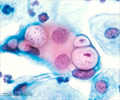Experts have revealed that young people are most likely to end up with sexually transmitted infections, as official records have shown record levels of STIs.

The HPA figures show clearly that people aged under 25 are most affected by STIs. Among women, 73 percent of new cases of gonorrhoea and 66 percent of new cases of genital warts involved under-25s.
Chlamydia was also most likely to be found in the under-25s (88 percent of cases), but that was partly to do with more sensitive tests and the targeting of the testing campaign to the age group.
But half of all new diagnoses in men also involved under-25s. That included 41 percent of male gonorrhoea diagnoses, 47 percent of male cases of genital warts and 69 percent of male cases of chlamydia. STI diagnoses were also high among men who have sex with men.
Genital warts and syphilis diagnoses have stabilised, the figures show, but gonorrhoea is on the increase, which raises a particular concern.
Resistance to the main antibiotic used to treat the infection, cefixime, rose from 0.1 percent in 2005 to 10.6 percent in 2009.
Advertisement
Many studies have shown that young adults are more likely to have unsafe sex and that they often lack the skills and confidence to negotiate safer methods.
About 10 percent of the 15 to 24-year-olds treated for a sexually transmitted infection will be re-infected within a year.
"The numbers we're seeing in teenagers are of particular concern as this suggests they are repeatedly putting their own, as well as others', long-term health at risk from STIs," the Guardian quoted Hughes as saying.
Marie Stopes International, a sexual health NGO, said the figures were extremely concerning.
"We fear that STI rates may continue to rise, particularly among young people, without increasing access to comprehensive sex and relationships education in all British schools," said Helen Jenkins, contraception and sexual health specialist.
"Many teachers tell us that they don't have the confidence or information to teach sex and relationships education effectively, despite knowing that many of their students are sexually active," she stated.
HPA advises that everyone should use a condom with any new sexual partner and visit a sexual health clinic after unsafe sex.
People should also be screened for chlamydia every year and whenever they get a new partner, and gay men should go for annual sexual health screening, including an HIV test.
Source-ANI










